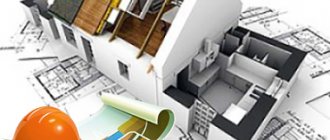New edition of Art. 17 Residential Complex of the Russian Federation
1. Residential premises are intended for the residence of citizens.
2. It is permitted to use residential premises for professional activities or individual entrepreneurial activities by citizens living there legally, if this does not violate the rights and legitimate interests of other citizens, as well as the requirements that the residential premises must meet.
3. It is not permitted to locate industrial production facilities, hotels, or carry out missionary activities in residential premises, except for the cases provided for in Article 16 of Federal Law No. 125-FZ of September 26, 1997 “On Freedom of Conscience and Religious Associations.” Residential premises in an apartment building cannot be used to provide hotel services.
4. The use of residential premises is carried out taking into account the rights and legitimate interests of citizens and neighbors living in this residential premises, fire safety requirements, sanitary and hygienic, environmental and other legal requirements, as well as in accordance with the rules for the use of residential premises approved by the authorized Government of the Russian Federation Federation is a federal executive body.
Legislative regulation
The purpose of a residential premises and the limits of its use are regulated by a mass of regulatory documents, and familiarization with them will help to avoid serious mistakes.
- The Housing Code is the basic law in the field of housing law, lists the basic rights and obligations of both the owner and the user of residential premises, and contains many other provisions.
- Civil Code - defines the general rules for the use by citizens of their rights, housing, in particular, it gives the definition of residential premises and the basic criteria for its use.
- Code of Administrative Offenses – the basis and limits for bringing liability, options for punishment for violations, in particular, the use of residential premises for other purposes.
- By-laws of a technical nature, for example, rules for the use of residential premises, its maintenance and repair.
- Sanitary and other hygienic standards determine the degree of danger of a particular activity.
Partially, the influence comes from judicial practice: the positions of the RF Armed Forces in the resolutions of the Plenums and Reviews of Practice.
Features of the use of residential premises
Premises are divided into residential and non-residential, the first are allocated for living, the second for economic or other needs of the house. A dwelling is an isolated space for the personal use of one person or members of his family or those whom he allows to move in.
The right to housing is a basic human right and is closely related to other rights, in particular the right to privacy.
Art. 17 of the Housing Code of the Russian Federation gives the right to limited use of housing in business activities. The limitations are expressed in two points:
- residents must give consent to engage in entrepreneurial and other activities;
- the person occupies the premises legally;
- standards of sanitation, hygiene and the rights of other neighboring residents are not violated.
Prohibition of production activities
The law prohibits engaging in production activities in an apartment or house. A specific definition of what this is is not given in any legislative act. The criterion is based not on an assessment of what the owner or tenant is doing, but on the extent to which his actions affect the rights and freedoms of other citizens. For example, in the apartment no one is engaged in any kind of production, but often allows themselves to shout or make noise. Noise is considered a violation of the rights of other residents, but does not exceed the scope of use of the premises.
Thus, using a residential premises for other purposes and violating the rights of other residents are not always the same thing.
How to prove intended use
A popular option for holding people accountable for misuse of residential premises is administrative liability for persons who have opened a private kindergarten in an apartment. At the same time, the Housing Code provides for liability for persons who use the property for purposes other than residence.
Based on the contents of the document, if the owner lives in the apartment and carries out business activities there, then he does not violate the law. The exception is situations where the rights of neighbors are violated in another way.
As evidence of his residence, a citizen can provide an inflatable mattress, a sofa, bed linen, personal hygiene items and other things that indicate that he sleeps, eats, and spends his leisure time there.
Thus, a sofa, dinner, a toothbrush and a couple of books can serve as evidence of the intended use of the apartment.
Responsibility for misuse of housing is provided for by the legislation of the Russian Federation. The violator may at a minimum be fined or, at a maximum, deprived of housing. Therefore, it is advisable to carry out business activities that violate the peace and other rights of neighbors in non-residential premises.
What types of business activities are allowed?
A striking example is the activity of lawyers, who are allowed to set up their offices in residential premises. They receive citizens, advise them, and draw up documents. Their activities have an intellectual form.
The same can be said about accountants, computer program developers and other specialists.
If we talk about manual labor specialists: seamstresses, jewelers, they are also not prohibited from working in residential premises.
In fact, we are talking about whether the infrastructure of the house will suffer from the activities of the entrepreneur, for example, the creation of excessive voltage in the electrical network, excessive load on the drainage system.
Some activities may pose a danger to others. For example, a rehabilitation doctor may well provide some services at home, but a virologist is unlikely to do so. The materials he works with are highly hazardous. We must not forget that a residential building is a building built and equipped for special purposes; it cannot be called universal.
So whether an entrepreneur has the right to use the premises as an office is determined by specific circumstances, and not by the types of his activities.
Why is it prohibited to use residential premises for other purposes?
The law does not precisely define what types of activities are permitted in residential premises. Based on an analysis of practice, we can conclude that activities that violate the rights of residents are prohibited.
The infrastructure of an apartment building or neighboring private houses should not be damaged by the actions of the entrepreneur. Problems include interruptions in water supply and overloads of the electrical network.
An apartment or residential building is intended for the residence of citizens. It cannot be considered suitable for all types of activities.
In a residential area, you should not use objects that are a source of increased noise or admit infectious patients. The law prohibits setting up corporate offices in apartments. This will require non-residential premises.
Rules for the use of residential premises
By government decision (Decree No. 25 of January 21, 2006), rules for the use of residential premises were adopted. This document applies to owners and users. He reveals the contents of Art. in more detail. 17 Housing Code of the Russian Federation.
It does not matter on what basis the housing was received (acquired by ownership or from the state or from an enterprise or employing organization). The set of rights and responsibilities is standard.
Their approximate list:
- the right of residence belongs to the owner and tenant and their family members and other persons whom they allowed to move in;
- the entry of other persons is permitted with the permission of other residents, with the exception of children who have not yet turned 18 years of age;
- Renting out premises is permitted with the consent of other residents and the owner;
- the tenant’s responsibilities include carrying out routine repairs, unless otherwise provided by agreement with the owner;
- the employer is obliged to pay utilities and other services on time;
- the resident is obliged to take care of the common property of the owners of the house, take measures to preserve it, and inform the owner about their need;
- redevelopment and reconstruction of residential premises is carried out exclusively in the manner prescribed by law.
The use of residential premises also implies rights. For example, a tenant has the right to demand proper living conditions. Often, authorities offer citizens in need of housing premises that are clearly not suitable for this. They either do not have normal heating, there is no drainage, and the minimum compliance with sanitary standards is not ensured.
Considering the fact that there is a whole mass of regulatory documents, the rules for the use of residential premises are indicative.
Commentary on Article 17 of the RF Housing Code
1. In Part 1 of Art. 17 of the Code reproduces the norm of paragraph 2 of Art. 288 of the Civil Code of the Russian Federation, which establishes the purpose of residential premises: they are intended for the residence of citizens. Unlike the RF Housing Code of 1983 (Article 7), the Code in this case does not emphasize that residential premises are intended for permanent residence of citizens. This is quite logical, since citizens can live in residential premises either permanently or temporarily, having the constitutional right to freedom of movement.
2 - 3. Like previous housing legislation, the Code does not allow the placement of industrial production in residential premises (a similar norm in a slightly different wording was contained in Part 2 of Article 7 of the RF Housing Code of 1983, then the corresponding ban was established in Clause 3 of Art. 288 Civil Code of the Russian Federation). In practice, this prohibition was often interpreted broadly and also applied to other types of business and professional activities.
Some lawyers rightly draw attention to the fact that the Code does not disclose the concept of “industrial production” for the purposes of housing legislation. There are also no definitions of this concept in other legislative acts. In this regard, in practice, difficulties may arise when resolving issues of classifying any type of activity as industrial production. Therefore, it is proposed to further establish in Art. 17 of the Code (by amending it) the main features of industrial production for the purposes of housing legislation <1>. ——————————— <1> See Commentary on the Housing Code of the Russian Federation / Ed. M.Yu. Tikhomirov. M.: Publishing house. Tikhomirova M.Yu., 2005 - 2006. P. 53.
The Code introduced another innovation - it is allowed to use residential premises for carrying out professional or individual entrepreneurial activities under the simultaneous presence of two conditions: a) if such activities are carried out by persons living in the residential premises legally; b) if such use of residential premises does not violate the rights and legitimate interests of other citizens, as well as sanitary and technical rules and regulations.
For example, in accordance with paragraphs 6 and 7 of Art. 21 Federal Law of May 31, 2002 N 63-FZ “On advocacy and the legal profession in the Russian Federation” <1> a lawyer has the right to use residential premises owned by him or members of his family by right of ownership to locate a lawyer’s office, with the consent of the latter. Residential premises occupied by a lawyer and members of his family under a rental agreement may be used by the lawyer to house a lawyer’s office with the consent of the landlord and all adults living with the lawyer. ——————————— <1> NW RF. 2002. N 23. Art. 2102; 2003. N 44. Art. 4262; 2004. N 35. Art. 3607; N 52. Art. 5267; 2007. N 31. Art. 4011; N 50. Art. 6233; 2008. N 30 (part II). Art. 3616.
An individual entrepreneur under Russian law is an individual registered in this capacity in the prescribed manner (a citizen of the Russian Federation, a foreign citizen, a stateless person) who carries out entrepreneurial activities directly (on his own behalf, without forming a legal entity for this purpose and through his own independent labor), which for these purposes acts independently if it has full legal capacity, and with the consent of a legal representative if the legal capacity of this person is limited due to age or law <1>. ——————————— <1> See more details: Tikhomirov M.Yu. Individual entrepreneur: legal status and types of activities. Fourth edition, with changes and additions. M.: Publishing house. Tikhomirova M.Yu., 2010. P. 59 et seq.
For example, entrepreneurs whose work is primarily related to intellectual activity - collecting and analyzing information, creating scientific and literary works, preparing works for publication, programming, accounting and auditing, tutoring, etc., can work directly at their place of residence. private notaries.
4. Part 4 art. 17 of the Code imposes mandatory requirements on persons who use residential premises. Fire safety requirements are determined by the Federal Law of December 21, 1994 N 69-FZ “On Fire Safety” <1> and the regulatory legal acts adopted in accordance with it. For sanitary, hygienic and other legal requirements, see the commentary to Art. 8 of the Code. ——————————— <1> NW RF. 1994. N 35. Art. 3649; 1995. N 35. Art. 3503; 1996. N 17. Art. 1911; 1998. N 4. Art. 430; 2000. N 46. Art. 4537; 2002. N 1. Art. 2; N 30. Art. 3033; 2003. N 2. Art. 167; 2004. N 27. Art. 2711; N 35. Art. 3607; 2005. N 14. Art. 1212; N 19. Art. 1752; 2006. N 6. Art. 636; N 44. Art. 4537; N 50. Art. 5279; N 52 (part I). Art. 5498; 2007. N 18. Art. 2117; N 43. Art. 5084; 2008. N 30 (part I). Art. 3593; 2009. N 11. Art. 1261; RG. 2009. November 27.
The rules for the use of residential premises are approved by Decree of the Government of the Russian Federation of January 21, 2006 N 25 “On approval of the Rules for the use of residential premises” <1>. These Rules determine the procedure for using residential premises of state and municipal housing funds, as well as residential premises owned by citizens in apartment buildings. ——————————— <1> NW RF. 2006. N 5. Art. 546.
Maintenance and repair
Regularly, co-owners of apartment buildings receive receipts that contain the line “maintenance and repair of residential premises.” Unknowing people are surprised to find out what it is.
The rules for the use of residential premises mostly apply to property for which one owner is responsible. The legislation provides for rules for the maintenance and repair of common property (RF Decree No. 413 dated August 13, 2006).
The document provides a long list of common property that is considered common. As a rule, these are equipment and premises that are used to service more than one apartment. This includes various utility networks.
The rules prescribe a minimum list of measures for cleaning and maintaining this property in order. Management organizations are not entitled to provide services less than this minimum.
The rules provide for periodic construction and technical examinations in order to assess the condition of a residential building.
Money for repairs and maintenance of a residential building is taken primarily from contributions from citizens who are required to pay for services monthly. Citizens entitled to benefits receive subsidies, paying only partly for services out of their own pockets.
Funds for capital repairs are also taken from the funds of the owners and the capital construction fund. Initiative owners have the right to choose to accumulate funds outside the framework of the fund in a special account. The money collected from it is intended for the renovation of one house.
It will not be possible to isolate yourself from the obligation to pay expenses for common property. The reason is that, having purchased an apartment, the owner also acquires a share in the common property.
A similar obligation is acquired by the owner of non-residential premises in an apartment building. Thus, the maintenance and repair of residential premises is both a general and personal responsibility.
Administrative fines
According to the Code of Administrative Offences, the following are punishable:
- for violation of the rules for the use of residential premises;
- for violation of maintenance and repair rules;
- unauthorized connection to water supply and sewerage systems;
- unauthorized connection to electrical and heating networks.
Violations are listed in Art. Art. 7.19–7.22 Code of Administrative Offences.
The first article includes actions to damage residential premises, their equipment, illegal redevelopment and re-equipment and use of residential premises for other purposes. Responsibility is insignificant.
The article for violations of the rules for maintaining and repairing premises, the procedure for recognizing the impossibility of living in them, illegal transfer of premises to non-residential, is intended for officials and organizations.
The amount of fines depends on who they are assigned to. Citizens are required to pay no more than 4 thousand rubles, officials and organizations pay from 4 to 50 thousand rubles.
The fines are reviewed periodically so that the values described will change over time.
Sanctions for misuse of premises
The law establishes liability for violating the rules for the use of residential premises. By non-purpose is meant the use of non-residential premises for human habitation, and residential premises for commercial, entrepreneurial or industrial activities.
The following sanctions are provided for violation of intended use:
- administrative responsibility;
- property liability;
- criminal liability.
Bringing to administrative responsibility
The Code of Administrative Offenses provides for punishment in the form of a fine for the following offenses:
- redevelopment by the owner of the premises;
- carrying out redevelopment work without obtaining the owner’s consent;
- unauthorized connection to electrical networks;
- unauthorized connection to water supply or sewerage.
Responsibility for uncoordinated redevelopment work for individuals will range from 1,500 to 2,000 rubles
.
The same actions committed by an official or legal entity are subject to punishment in the form of fines from 4,000 to 50,000 rubles.
The amount of fines is indicated as of 2021.
Briefly about property liability
A person who maliciously (at least 3 times) violated the rules for the use of residential premises is brought to property liability. The result is the seizure of residential premises and its sale. Cash is paid to the owner minus the amount necessary to bring the property into proper condition.
Important!
The law prohibits the sale of an apartment if it is the owner’s only home. However, this does not mean impunity. The authorized body is given the right to issue a fine for redevelopment an infinite number of times.
The tenant of the premises is evicted for such a violation without providing alternative living space. The issue will be resolved through the courts.
Register now and get a free consultation from Specialists
A little about criminal liability
If a citizen’s actions aimed at misuse of residential premises result in harm to the health of neighbors or family members, the person may be held criminally liable.
It is necessary to note that a specific citizen is brought to criminal liability, and not the enterprise as a whole.
In most cases, the perpetrators are prosecuted for causing harm to the health of citizens. The Criminal Code provides for a maximum penalty of 15 years in prison.
Property liability
Administrative fines are a measure of liability to the state; they do not exempt from payment of compensation for property and moral damage. Material losses are paid in full.
In addition, a citizen who has been brought to administrative responsibility for violations of housing legislation at least three times may lose his or her housing.
The law specifies repeated violations; in practice, 3 times a year are usually sufficient. The severity of the violations and other circumstances are taken into account.
If he received it from the state, then the contract for the right to use with him is terminated through the court, and he is evicted without the right to receive other housing.
If housing is privatized, then the law assumes the right of the state to buy it and evict the citizen. The presence of debts or other obligations, if there is only one piece of real estate for living, deprives the state of the opportunity to sell it and transfer the rest of the money to the former owner. There is a contradiction in the legislation, and it has not yet been eliminated.








